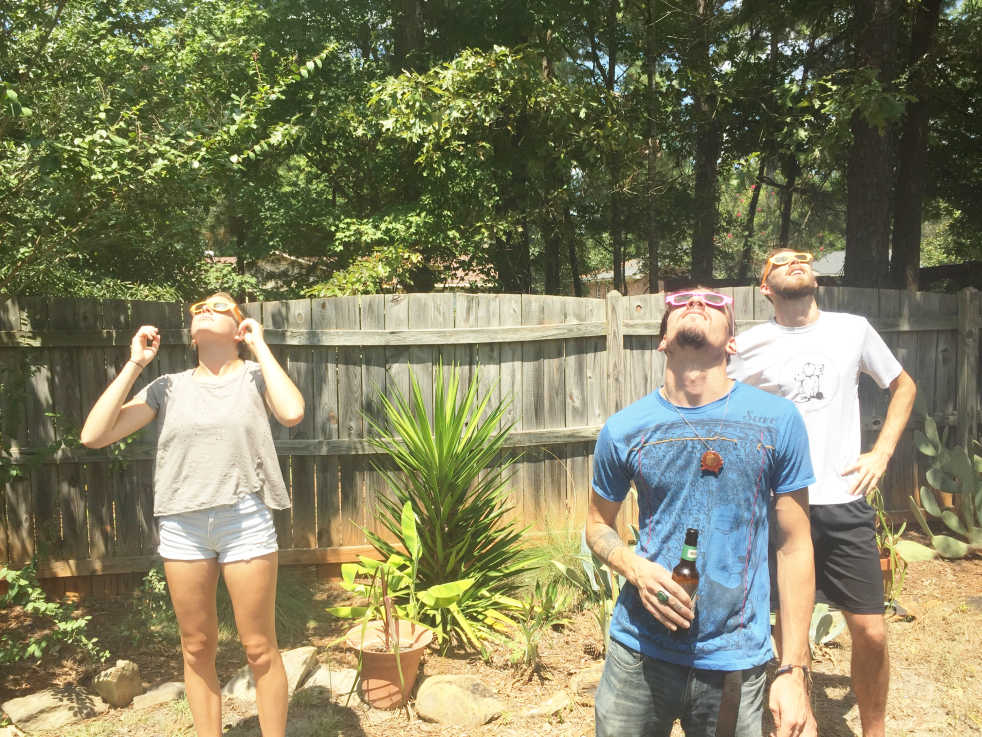This was the moment that some people anticipated for nearly four decades, while others had only heard of it a few weeks before. Some students thought of it simply as the first day of classes, while for other people Tuesday was their first day of classes. On Monday, Aug. 21st 2017, Tech was in the path for 97 percent of totality of the solar eclipse, which meant at the peak of the eclipse, the moon was covering 97 percent of the sun.
Tech students reacted to this natural phenomenon in a multitude of ways. Some stayed on campus to watch and others left to witness 100 percent totality. Astronomy buffs and plain science-lovers alike flocked to the path of totality where many such locations could be accessed at just a two-hour drive away from Atlanta.
The president of the Tech Astronomy Club, Darian Bender, fourth-year PHYS, organized an extensive club carpool event for approximately 70 people, including students who were not organization members. Bender is one of the people who knew about the eclipse far in advance. She, alongside the efforts of the other officers of Astronomy Club, arranged an overnight camping trip to Tennessee the night before the eclipse.
“The Astronomy Club tried to conduct outreach events starting at the end of the 2016-17 school year,” she said. “We knew that the eclipse was the first day of classes in Fall 2017, so we had to start planning the event early so that we can get people on campus and on the road the day before classes started.”
Bender had to deal with many complications in planning the club’s trip to see totality. She had to find rides for dozens of people, calculate costs, organize reimbursement and find a suitable campsite that could hold up to 80 people, as well as finding a way to acquire enough solar eclipse glasses and camping gear. There were also participants who dropped out and others who joined the trip at the last minute.
Bender was motivated by excitement and her love for astronomy. “I knew it was a special event, that few people have the chance to see throughout their entire lifetimes. I was lucky that [the campsite] was only a short three-to-four-hour drive away from totality! … At that time, the corona is visible to the naked eye. It looks absolutely stunning. The experience at 97 percent just isn’t the same.”
The environment that everyone at the Astronomy Club experienced during their eclipse viewing was a stark contrast to the situation back at Georgia Tech. While the people on the overnight trip slept under a shooting-star filled designated dark sky, students who stayed on campus spent the night preparing for their first day of classes.
Gen Tanno, second year AE, was one such student. He only got to see the eclipse because his professor paused class for thirty minutes to allow the students to go outside to the Instructional Center Lawn. The Georgia Tech College of Sciences and some faculty from different departments prepared the university for the upcoming natural phenomena by setting up a filtered telescope and an eclipse livestream from the observatory and allocating eclipse-viewing glasses around campus.
Tanno recalls waiting in line for these glasses but giving up because the lines were too long. Luckily, the aerospace department also gave out glasses. He was impressed but says, “I wish it was 100 percent [totality], and there were clouds so it wasn’t good half the time.”
Many students expressed more negative sentiments concerning the viewing from Tech. There was a large collective opinion that the eclipse was over-hyped. Tanno explains this is probably because a lot of people simply jumped on the bandwagon and were not informed about what the experience would actually entail.
Bender has met more people who were awestruck by the eclipse.
“I think the only people who were unimpressed by the eclipse were those who didn’t get to see totality. I don’t know how you can see the total eclipse and not be impressed. However, some might have been disappointed if it was cloudy in their area. Additionally, I’m sure some were disappointed that totality did not last longer. Two and a half minutes felt much shorter at the time. I’d love it if it lasted thirty minutes or so. Oh well — I’ll just have to go see another eclipse!”
The next eclipse will occur in April 2024 and some students, like Bender, are already thinking of the logistics to view it.
